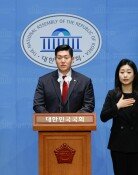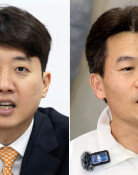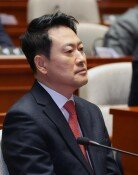Ruling party should put its reform proposals into action
Ruling party should put its reform proposals into action
Posted January. 26, 2022 07:59,
Updated January. 26, 2022 07:59
Song Young-gil, the ruling Democratic Party’s leader, proposed a membership reshuffle and reorganization of its political structure. Song said he would not run for a forthcoming general election and that the party would not field its own candidate in the by-election for the three of its constituencies, where the occurrence of a vacancy was imputable to the faults of the party. He also promised to expedite the process for passing a bill to remove Rep. Yoon Mi-hyang and Rep. Lee Sang-jik, former DP representatives, and to promote a system that prohibits members of the National Assembly to serve more than three consecutive terms in the same constituency.
This series of reform agenda is part of a response to the concerns raised from within the ruling party following recent stagnation of approval ratings of the presidential candidate Lee Jae-myung. Rep. Kim Jong-min also proposed that the political establishment should withdraw themselves from political participation, and Rep. Jeong Seong-ho and six others in Lee’s tight circle proclaimed that they would not serve any position under Lee’s administration. It is in this context Song made a declaration of his non-candidacy for general election, urged fellow politicians who are often called as “86 group,” and promised efforts to ban the same person from serving consecutive terms in the same constituency.
Whether this audacious declaration of Song, who has served five terms as a member of the National Assembly and mayor of Incheon, will spark off other established politicians to follow suit remains unknown. Yet Song’s call for reform that senior politicians should go to the wilderness is noteworthy. Many of the incumbent politicians who started their career through the 1996 and 2000 general election have been sitting tight for more than 20 years as South Korea’s political establishment. The self-resignation of the 86 group was called for back in 2020 when nomination for general election was about to be carried out, but such a request went obsolete. This time should be different.
That the ruling party announced not to field their members as candidates for the three constituencies, including Jongno (Seoul), Anseong (Gyeonggi), and Sangdang (Cheongju), where a by-election is held because of the faults on the part of the Democratic Party, is meaningful in that the ruling party is taking responsibility. It would be foolish for the ruling Democratic Party to repeat the error of the April 7 by-election in 2021, when it fielded its members for mayoral candidacy in Seoul and Busan at the expense of revising its party constitution, which sparked off harsh criticism from the public. The main opposition People Power Party should also clarify its position, as a by-election in Seoul’s Seocho-Gab and Jung-gu and Nam-gu in Daegu is caused by the PPP’s faults. A system under which political parties that provided reasons for by-elections are prohibited to field their members for candidates must be instituted in the future.
Prohibition of politicians from serving three consecutive terms in the same constituency is also worth assessment of legal and political merits, as it has been a common practice for several political establishments to hold on to power in the same constituency by exploiting incumbency advantage. The persistent controversy over fairness with the heads of local governments also needs to be dealt with. Empty words will not win the DP public confidence it has lost. For the Democratic Party to regain public trust, it may have to push for legislation of such efforts as the party’s agenda. With less than 40 days left for the presidential election, the ruling party should not merely pretend reform with an ulterior motive of raising its ratings prior to the Lunar New Year holidays. The public would not be deceived, and such sham maneuver would instead backfire.







